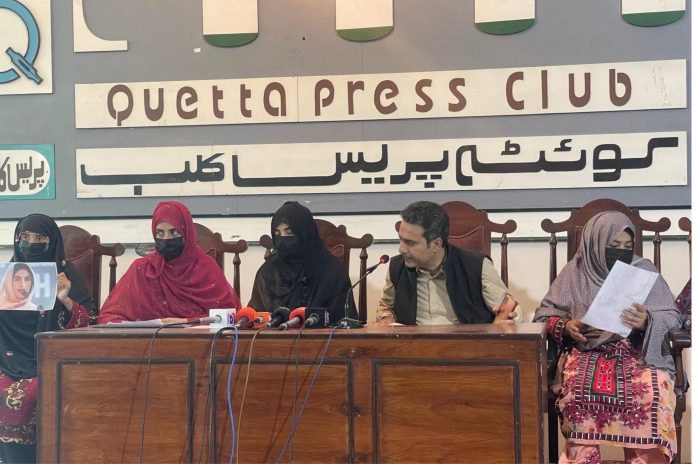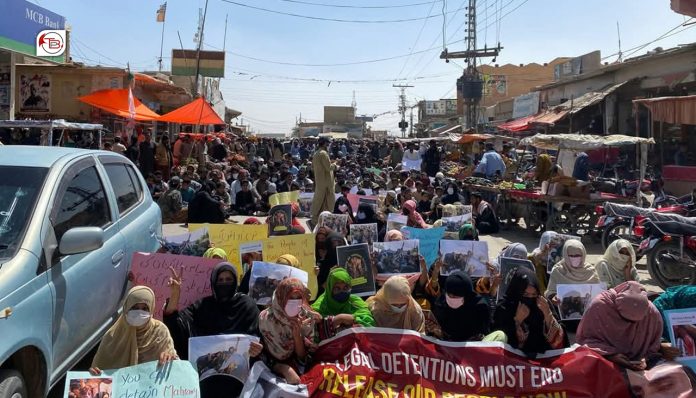The imprisonment of Dr. Mahrang Baloch, the leader of the Baloch Yakjehti Committee (BYC) and a prominent Baloch activist and human rights defender, has sparked widespread condemnation from her family, political figures, and human rights organizations.
Dr. Mahrang, known for her work in exposing enforced disappearances and state violence in Balochistan, was taken into custody in Quetta and remains incarcerated on allegedly politically motivated charges. Her family, led by her sister Nadia Baloch, has denounced the mistreatment she faces in prison, including round-the-clock surveillance, deprivation of basic rights, and restrictions on family visits. They are demanding her immediate release, calling her detention a clear attempt to silence voices advocating for Baloch rights.
Dr. Mahrang was arrested while participating in a protest against enforced disappearances, a longstanding issue in Balochistan. Since her detention, she has been subjected to harsh conditions, including inadequate medical care, psychological harassment, and isolation. Nadia Baloch, in a recent press conference, stated that the authorities have installed surveillance cameras inside Dr. Mahrang’s cell and even in front of the bathroom, an act she described as a blatant violation of privacy and dignity. She further revealed that despite court orders for humane treatment, prison officials continue to ignore these directives, exacerbating concerns about Dr. Mahrang’s safety.

The activist’s case has garnered international attention, with human rights organizations raising concerns about the suppression of political dissent in Pakistan. Ghaffar Baloch, a senior leader of the National Party from Quetta, met with Beebow Baloch, who echoed growing concerns for Dr. Mahrang’s safety. Beebow, who is also in custody, shared that Dr. Mahrang’s health is deteriorating due to harassment in prison, including the installation of covert surveillance cameras in her cell and the denial of proper food and medical care. Despite court orders for her basic rights to be respected, Dr. Mahrang continues to face mounting pressure and abuse from prison authorities.
Speaking at a press conference in Quetta, Nadia Baloch placed Dr. Mahrang’s imprisonment in the broader context of state repression in Balochistan. She spoke of their family’s history of suffering at the hands of the authorities, recalling how their father, Abdul Ghafar, was wrongfully imprisoned and later killed. She explained that Dr. Mahrang’s activism is deeply personal, driven by years of witnessing injustices inflicted on the Baloch people. She accused the state of targeting peaceful activists while ignoring its constitutional obligations to protect human rights.
Protests demanding Dr. Mahrang’s release have erupted across Balochistan, with a recent demonstration organized by the Baloch Yakjehti Committee (BYC) in Surab drawing significant participation. Protesters condemned the targeting of Baloch women activists, stating that such actions would only strengthen their resolve to fight against oppression. They warned that unless Dr. Mahrang and other detained activists are released, protests will escalate. The speakers at the protest highlighted how the state’s actions reflect a systematic campaign to silence Baloch voices through intimidation, imprisonment, and enforced disappearances.

Despite mounting pressure, the Pakistani government has yet to respond to calls for Dr. Mahrang’s release. Her family and supporters continue to urge international human rights organizations, including the United Nations and Amnesty International, to intervene. They argue that her imprisonment represents not only an attack on an individual activist but a broader assault on fundamental rights and freedoms in Pakistan. The case of Dr. Mahrang Baloch has become a symbol of the ongoing struggle for justice in Balochistan, and her supporters remain determined to fight for her freedom.





























